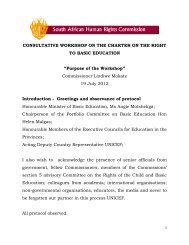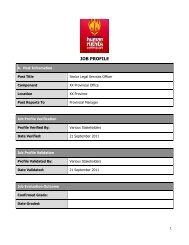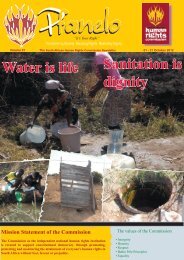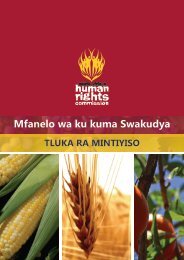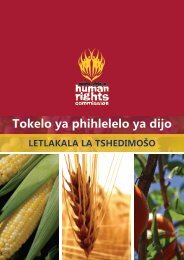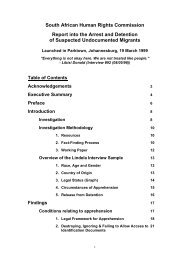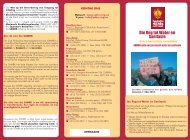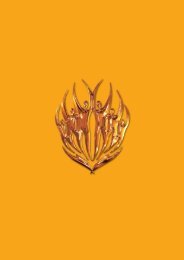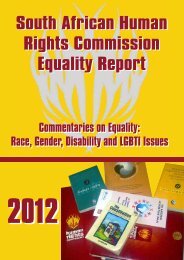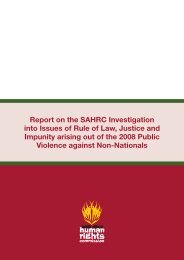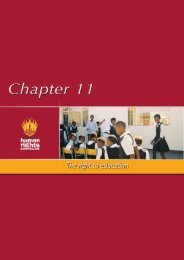Chapter 1 - South African Human Rights Commission
Chapter 1 - South African Human Rights Commission
Chapter 1 - South African Human Rights Commission
- No tags were found...
You also want an ePaper? Increase the reach of your titles
YUMPU automatically turns print PDFs into web optimized ePapers that Google loves.
Participation: Submissions and Public Hearings<br />
Submissions were made by departments and civil society organisations. In respect of the submissions from the<br />
government, only fourteen departments across all spheres of government provided the <strong>Commission</strong> with written<br />
submissions. The key departments and their provincial counterparts from whom the <strong>Commission</strong> requested<br />
submissions are listed below:<br />
Department of Agriculture<br />
Department of Basic Education<br />
Department of Environmental Affairs and Tourism<br />
Department of Housing<br />
Department of Minerals and Energy<br />
Department of Local and Provincial Government<br />
Department of Water Affairs and Forestry<br />
Department of Rural Development and Land Affairs<br />
Department of Health<br />
Department of Social Development<br />
Table 1: Key Government Departments<br />
Out of the nine provincial governments in <strong>South</strong> Africa, four did not make any submissions to the public<br />
hearings: these are the Eastern Cape, the North West Province, KwaZulu-Natal (KZN) and the Free State. The<br />
Western Cape was the only province that showed a real commitment to the process and respect for the work<br />
of <strong>Commission</strong>. It made one general submission from the Of ce of the Premier, and ve submissions from its<br />
departments, namely, from Environmental Affairs and Development Planning, Social Development, Health, Local<br />
Government and Housing and Education. It also made oral submissions to each of the sessions at the hearings.<br />
Gauteng, Limpopo, and the Northern Cape made one submission each. Two National departments did not make<br />
written submissions, namely the Departments of Social Development, and Rural Development and Land Affairs.<br />
The national department of Social Development did not attend the public hearings, but made a submission to the<br />
hearings. The Department of Rural Development and Land Affairs sent a representative who was identi ed the<br />
day before the public hearings. This setback for the Department of Rural Development and Land Affairs led to the<br />
department’s submission being prejudiced by the short notice as the representative did not have suf cient time to<br />
prepare in respect of the <strong>Commission</strong>’s terms of reference.<br />
As time for questions and answers was limited, and signi cant questions were raised, government departments<br />
were requested to present their answers in writing to the <strong>Commission</strong>. However, none of the government<br />
departments provided the written responses as per the request of the <strong>Commission</strong>.<br />
1.2.6. The Review and Reporting Process<br />
Following a process of selection, an external provider, <strong>South</strong>ern Hemisphere Consulting, was appointed to write<br />
the report on the hearings. The provider received a guideline for report writing, as well as all the background<br />
documentation and the written submissions. The provider also attended each hearing and received the transcripts.<br />
A report structure was approved by the <strong>Commission</strong>, and the rst draft of the report was submitted on the 14<br />
September 2009. Comments were received from the <strong>Commission</strong> on the 5 October 2009, and a nal report<br />
was submitted by the external provider on the 7 December 2009. The Economic and Social <strong>Rights</strong> Unit of the<br />
<strong>Commission</strong> then edited the report for its launch and dissemination to the Parliament of <strong>South</strong> Africa.<br />
According to the <strong>South</strong> <strong>African</strong> <strong>Human</strong> <strong>Rights</strong> <strong>Commission</strong> Act of 1994, the <strong>Commission</strong> has a constitutional<br />
mandate to submit reports to the President of <strong>South</strong> Africa and Parliament in respect of meeting its objectives.<br />
Parliament provides an effective oversight function over the <strong>Commission</strong> and its functions. The ESR report is<br />
one such report that the <strong>Commission</strong> is obliged to submit to Parliament as stipulated by section 184 (3) of the<br />
Constitution.<br />
6<br />
7 th Report on Economic and Social <strong>Rights</strong>, <strong>South</strong> <strong>African</strong> <strong>Human</strong> <strong>Rights</strong> <strong>Commission</strong>, 2006–2009



